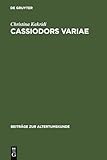Cassiodors Variae. Literatur und Politik im ostgotischen Italien / Christina Kakridi.
Material type: TextSeries: Beiträge zur Altertumskunde ; 223Publisher: Leipzig : B. G. Teubner, [2012]Copyright date: ©2005Edition: 1. AuflDescription: 1 online resource (419 p.)Content type:
TextSeries: Beiträge zur Altertumskunde ; 223Publisher: Leipzig : B. G. Teubner, [2012]Copyright date: ©2005Edition: 1. AuflDescription: 1 online resource (419 p.)Content type: - 9783598778353
- 9783110928822
- 930
- PA6271.C4 V353 2005
- online - DeGruyter
- Issued also in print.
| Item type | Current library | Call number | URL | Status | Notes | Barcode | |
|---|---|---|---|---|---|---|---|
 eBook
eBook
|
Biblioteca "Angelicum" Pont. Univ. S.Tommaso d'Aquino Nuvola online | online - DeGruyter (Browse shelf(Opens below)) | Online access | Not for loan (Accesso limitato) | Accesso per gli utenti autorizzati / Access for authorized users | (dgr)9783110928822 |
i-iv -- Vorwort -- Inhaltsverzeichnis -- 1. Einleitung -- 2. Die Variae und ihr literarisches Umfeld -- 3. Die Variae und ihr politisches Umfeld -- 4. Die gesellschaftliche Utopie -- 5. Das aristokratische Ethos in den Variae -- 6. Schlusswort -- 7. Literaturverzeichnis -- 420
restricted access online access with authorization star
http://purl.org/coar/access_right/c_16ec
Die lateinische Literatur der Spätantike löst weiterhin Befremden aus, obwohl die Philologie seit einigen Jahrzehnten eifrig bemüht ist, ihre besonderen Voraussetzungen zu beschreiben und ein ausgewogenes Urteil über sie zu fällen. Die vorliegende Göttinger Dissertation versteht sich als ein Beitrag in diesem noch andauernden Prozess der Neubewertung spätantiker Werke und versucht eine Gesamtwürdigung von Cassiodors Urkundensammlung Variae. Unter Berücksichtigung der neuesten Forschung werden die literarischen Konventionen herausgearbeitet, die Inhalt und Gestalt des Werken geprägt haben (gattungsspezifische Vorgaben, ästhetische Vorlieben und philosophische bzw. christliche Hintergründe). Nur die Kenntnis dieses komplizierten Regelwerks ermöglicht es, die Ziele des Autors zu beschreiben und zu erkennen, in welcher Weise sich die politischen und gesellschaftlichen Umwälzungen im Italien des 6. Jahrhunderts im Werk niederschlagen. Der große Abstand, der den heutigen Leser vom spätantiken Autor trennt, kann niemals vollkommen überwunden werden. Dennoch kommt das Buch zu dem Ergebnis, dass die Variae Cassiodors Elemente einer politischen Ideologie und einer literarischen Ästhetik enthalten, die ein modernes Interesse an dem Werk begründen können.
Most modern readers find the Latin literature of the late antiquity obscure, if not outright bewildering. Over the last decades, classicists have made considerable efforts both toward describing the specific literary conventions observed in these works, and also toward formulating a balanced appraisal of their theoretical, literary and aesthetic merits. The book at hand, originally submitted as a dissertation to the University of Göttingen, seeks to contribute to this burgeoning literature, by offering an overall assessment of Cassiodor's Variae, a compilation of official state documents. In light of the most recent developments in the field, the author diligently traces out the application of traditional writing conventions in the construction of these documents (content and assertions of the underlying "genus", aesthetic standards and philosophical resp. Christian background). Only a thorough grasp of these conventions makes it possible, not only to identify and describe the author's objectives, but also to reveal the pathways through which the political and social upheavals of 6th century Italy find their way into the passages of the Variae. Even though the large distance separating modern readers from the late-antiquity can never be entirely bridged, this book demonstrates that Cassiodor's Variae contains elements of a political ideology and a literary aesthetic that transcend the narrow confines of the author's times and render his work both stimulating and relevant to this day.
Issued also in print.
Mode of access: Internet via World Wide Web.
In German.
Description based on online resource; title from PDF title page (publisher's Web site, viewed 28. Feb 2023)


